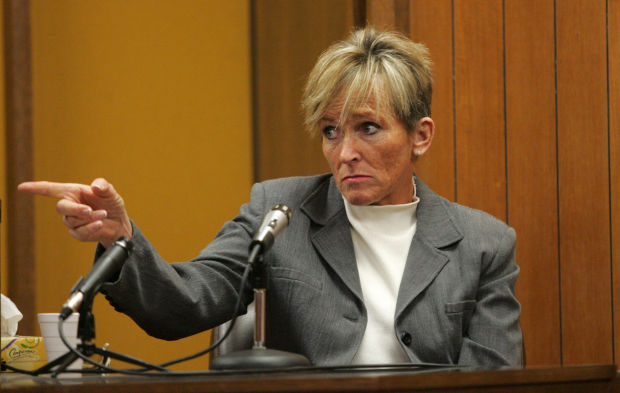
On 9 June 2016, Chief United States District Judge for the District of New Mexico M. Christina Armijo signed an 8-page order suppressing inculpatory statements made to an FBI polygraph examiner by the suspect in a child molestation investigation. The post-polygraph statements made by Jamaico Tennison to FBI Special Agent and polygraph examiner Jennifer Sullivan constituted the key evidence against Tennison, who was criminally charged.
Armijo, a George W. Bush appointee, had serious concerns about the voluntariness of Tennison’s statements, noting “Sullivan’s interrogation of Defendant on June 11, 2014 was tainted by the denial of Defendant’s request for appointed counsel.” Armijo also expressed serious concerns about the polygraph “test” (at pp. 6-7):
The polygraph exam
The Court and the parties spent a considerable amount of time and effort addressing the validity of the results of the polygraph examination conducted by SA Sullivan on June 11, 2014. SA Sullivan conducted a polygraph examination that was valid under the FBI’s in-house protocols. Although SA Sullivan is an experienced polygrapher, she demonstrated little understanding of, or interest in, the underlying theory. The FBI employs a three-point scoring system, knowing that it enhances sensitivity at the expense of specificity. SA Sullivan uses this standard FBI format because it is what she is authorized to use. She believes that her polygraphs are 100% accurate. In fact, from the testimony adduced at trial, due to the high sensitivity and low specificity of the FBI format, an innocent person has about a one-in-three chance of being classified as non-deceptive. The likelihood that innocent subjects will be subjected to post-test interrogation is heightened by SA Sullivan’s practice of interrogating any subject whose scores are inconclusive, not merely those subjects whose charts are scored as deceptive. Moreover, the Court does not find the single study of the two comparison-two relevant questions format cited by the United States…as conclusive of the validity of the two comparison-two relevant questions format. Based upon the testimony adduced at hearing, the Court is left with the impression that as used by SA Sullivan in Defendant’s case, the polygraph examination was employed to ratchet up the emotional pressure in anticipation of the inevitable interrogation of Defendant.
The equipment used by Agent Sullivan was capable of making an audio recording. Pursuant to FBI policy, Agent Sullivan did not record the pre-test or the polygraph examination proper, and for reasons of her own, did not record the post-test interrogation. Under the circumstances of this case, the absence of a recording of the interrogation, which would have permitted the Court to hear the actual words and the tones of voice of the participants, constitutes a failure of proof as to whether SA Sullivan conducted her interrogation within Fifth Amendment bounds. See United States v. Bundy, 966 F. Supp. 2d 1180, 1186 (D.N.M. 2013).
The Court further concludes that the taint of the initial confession was not sufficiently dissipated before the final interrogation, which began a few minutes after the unrecorded post-test interrogation. Accordingly, the statements made by Defendant during the final recorded interrogation were the fruit of the involuntary unrecorded confession. See Lopez, 437 F.3d at 1066.

Selected filings from U.S. v. Tennison (Case 1:15-cr-00212-MCA in the District Court for the District of New Mexico), including hearing transcripts, are available on AntiPolygraph.org’s Polygraph Litigation page. This case will be of particular interest to defendants in criminal cases seeking to suppress uncounseled statements made to polygraph operators.
First let me say how much I respect Judge Armijo. In fact I sent her a letter expressing my respect and appreciation and applauding her insight and courage. I told her that she is absolutely right about the polygraph. I also sent her a copy of my book FROM COP TO CRUSADER – THE STORY OF MY FIGHT AGAINST THE DANGEROUS MYTH OF LIE DETECTION.
I was delighted to read this sentence in Judge Armijo’s order: “Although SA Sullivan is an experienced polygrapher, she demonstrated little understanding of, or interest in, the underlying theory.” Perhaps one of the reason for Sullivan’s seemingly lack of understanding or interest in the underlying theory of using the polygraph as a “lie detector” is due to the fact that the use of the polygraph as a “lie detector” is based on a faulty scientific premise and she is reluctant to try to explain this underlying theory because she knows it is BULLSHIT! In order for the polygraph to be 100% accurate as a “lie detector” – as Sullivan claims it is – the reaction that brands a person as a liar must ALWAYS be caused by the act of lying. The problem is that this “lying reaction” is simply a nervous reaction to a stimulus – this reaction is commonly referred to as the “fight or flight response”. This response can be triggered by the act of lying – perhaps as much as 50% of the time – but it can also be triggered by any number of innocent stimuli that have absolutely nothing to do with lying. In fact, the reaction that will brand a person as a liar can be caused by many things – misplaced guilt, the rational fear of being falsely accused of deception, anger at having been asked an accusatory question, simple nervousness about taking the test, even something as simple as the tone of the polygraph operator’s voice when he/she asks the question can cause a person to have a reaction that would brand them as a liar.
But I think the primary reason Sullivan (and all polygraphists) are reluctant to discuss the underlying theory of the so-called “lie detector” is that if they explained it, they would be laughed out of court. Let’s say Sullivan actually told the truth about the fraud of polygraph “testing”. Here is how the explanation would go: “OK Your Honor, let me explain how we decide whether or not a person is lying or telling the truth. First, we come up with the questions we are going to ask on the test. The first category of questions are called “relevant questions” and these will be about the crime in question. The most relevant question would be something like, “Did you molest young Suzie?” Then there would be other relevant questions specifically inquiring about the elements of this crime such as: “Did you insert your finger into Suzie’s vagina?” “Did you remove Suzie’s clothing?” “Did you fondle Suzie?” etc., etc., etc… We then compose what we call “control questions.” These “control questions” would be something like: “Have you ever engaged in any unusual sex acts?” “Have you ever deliberately hurt anyone?” etc., etc., etc… During the test we will ask the relevant questions interspersed with the control questions – and the theory of the “lie detector” is that a liar will have a reaction on the relevant questions that is greater than his reaction to the control questions.
So, Sullivan would say, to summarize the theory behind the “lie detector,” and to explain why I believe the polygraph is 100% accurate as a “lie detector” let me just say that I am certain that 100% of the time, when a person’s heart starts to beat faster, and their fingers start to sweat, and their breathing becomes erratic, that they have lied to that question that has been asked. And I can say with 100% certainty that the psychological impact of the control questions is the same as that of the relevant questions so that we can compare those reactions and determine with 100% certainty that when they react to a relevant question to a greater degree than the control question that they are in fact lying – 100% of the time.
The reason polygraphers don’t explain the theory behind the “lie detector” is that they know it is absurd. In truth and in fact the polygraph is just an aid to an interrogation and the only part it plays in the little interrogation drama is that it frightens and intimidates a person into a confession. As Judge Armijo so eloquently stated in her order: “the polygraph examination was employed to ratchet up the emotional pressure in anticipation of the inevitable interrogation of Defendant.”
There is no scientific basis for calling the polygraph a “lie detector,” and there is no way a polygrapher could in good conscience say that they believe it is 100% accurate. As with Sullivan, polygraph operators will not usually try to explain the theory behind calling the polygraph a “lie detector” – especially when they are under oath – because they know there is no way they can explain to anyone’s satisfaction why they believe it is 100% accurate as a “lie detector” – and there is absolutely no way they can make their explanation sound even remotely believable. But I have been an expert witness in numerous court/arbitration hearings testifying that the polygraph is a fraud. And in these hearings I have heard polygraphers try to explain the theory behind lie detection via polygraph – they always couch their explanation in shady scientific jargon AKA doubletalk. In my book FROM COP TO CRUSADER, I have a chapter entitled “SAME OLD SNAKE OIL – DIFFERENT BOTTLE.” This chapter is full of direct quotes from polygraphers – taken directly from the transcripts of hearings in which I have been an expert witness. It is enormously entertaining to listen to these frauds try to explain this ridiculous theory propping up the use of the polygraph as a “lie detector.” It is worth reading because there is no other place you can read such a hilarious collection of nothing but pseudo-scientific nonsense presented with a straight face by self proclaimed experts. I would leave Sullivan and all the other polygraph con artists perpetrating this massive fraud called lie detection with this question: Are you really that stupid – or do you just think we are?
[…] See link to article here. […]
I definitely wouldn’t want to encounter SA/polygrapher in a dark alley ! lol
[…] And for an example of a federal case where a post-polygraph confession was suppressed, see our 2016 article, Federal Judge Throws Out FBI Post-Polygraph Confession Over Concerns About Voluntariness. […]